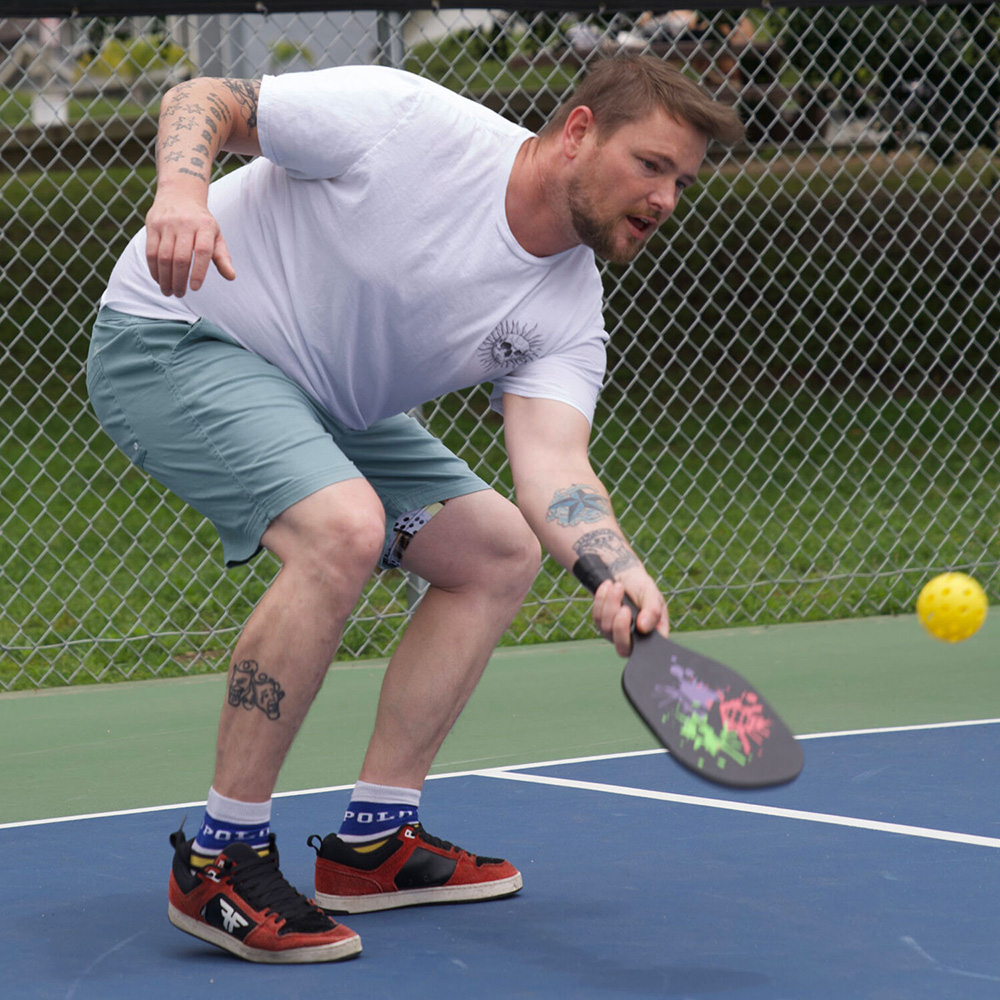Many people enter sobriety thinking that their time to have fun has ended. Without drugs and alcohol, they believe that “the party is over,” and they won’t be able to enjoy life anymore.
Nothing could be farther from the truth.
For many of us, life in recovery is more fun than we ever imagined—partly because we get to learn who we actually are and what we actually enjoy in sobriety. As they say in the AA Big Book, “We are not a glum lot.” Below, we’ll talk about how finding a hobby in sobriety can improve your mental, emotional, and physical well-being, and suggestions for finding activities that not only help you navigate the recovery process, but also bring fun, fulfillment, and a renewed sense of purpose to your life.
Keep in mind:
- Hobbies are essential in recovery, offering emotional regulation, a barrier against old habits, and a release of feel-good chemicals for mental health and sobriety.
- Engaging in physical activities, creative outlets, and social events supports the recovery process by improving physical health, providing emotional expression, and ensuring connectedness and community participation.
- Developing new skills and interests through activities like cooking, language learning, and DIY projects fosters self-esteem, cognitive renewal, and a sense of achievement, contributing to a fulfilling sober life.
The Power of Hobbies in Addiction Recovery
Engaging in new hobbies is integral to the successful recovery process for individuals overcoming substance abuse. They are essential components that reshape a recovering addict’s life into one enriched with satisfaction and free from addiction’s grip. Beyond just filling time, these pursuits act as vital allies in maintaining sobriety by:
- aiding in emotional regulation and stress management
- forming a buffer against the pull of previous habits
- boosting serotonin through wholesome activities, thereby bolstering mental health and providing a natural countermeasure to substance use temptations.
Taking up and excelling at a new hobby doesn’t merely enhance proficiency. It builds self-assurance and serves as evidence of triumph over adversity. Every hobby claimed or interest developed takes over territory once ruled by dependency, infusing previously dark corners with engaging endeavors synonymous with happiness and intent. The path toward long-term sobriety isn’t about speed but endurance—a continuous effort where hobbies stand as significant markers on the road to enduring abstinence.
Mental Health Benefits
Imagine your brain as an intricate landscape shaped by the river of experiences that flow through it. Engaging in hobbies gently nourishes this topography, fostering new neural pathways and rejuvenating cognitive abilities dulled by substance addiction. Participating in creative pursuits hones mental sharpness, thereby improving memory, focus, and adept problem-solving skills. Journaling stands out among these activities. Not only does it reinforce memory retention, but it also allows for the purging of persistent thoughts tied to a history of substance abuse.
Pursuing artistic expression like art therapy can calm the tumultuous emotions associated with anxiety, depression, and PTSD—frequent disturbances for those who have grappled with substance addiction. Whether strumming guitar chords rhythmically or taking mindful breaths during yoga practice—the acts themselves become kinetic meditations that stimulate dopamine production while anchoring individuals firmly to the now. Engaging in volunteer work expands healing beyond personal benefit—it lessens co-occurring mental health challenges by building community ties through altruism. Hobbies serve as a remedy against dull idle time, which unchecked may steer one back toward relapse risks. They carve out a peaceful haven for well-being support that fosters stress reduction and creates nurturing conditions ideal for maintaining sobriety stability.
Building Self-Esteem
In the transformative stage of recovery, having a solid sense of self-esteem is crucial as it forms the base upon which a fresh identity takes shape. Engaging in do-it-yourself projects can provide physical evidence of one’s progress, with each accomplishment acting as a reflection that bolsters internal confidence. This path isn’t solely about restoring what was once there. It’s also focused on creating something more robust and durable than before. Activities such as biking or playing an instrument become harmonious displays of independence—with every turn of the wheel or strumming pattern representing strides toward autonomy and regimented habituation. When engaged in community service, genuine appreciation from others has profound resonance, making visible one’s contributions and amplifying feelings of worthiness and acknowledgment.
The temptation to learn a new language presents itself with opportunities for richer exchanges and deeper cultural insights—achieving fluency becomes emblematic of an individual’s strength and aptitude during their recuperation process. These pastimes lay down stones for re-establishing oneself where self-value is no longer elusive but rather well-established territory underfoot—empowering those on the road to recovery to tread forward assertively into newfound assurance.
Fostering a Sense of Purpose
Having a sense of purpose serves as the north star in recovery, guiding those in its early stages towards clarity and meaningful existence. Journaling and engaging in volunteer work do more than fill time—they lay down the building blocks for a structured life that embraces accountability and responsibility, key components to sustaining sobriety. Exploring old interests or learning new ones is not merely recreational. It represents a rebirth of one’s identity, offering an opportunity to revive dormant parts of oneself or uncover previously hidden facets. The success stories shared within support groups act as powerful testaments to what’s achievable, serving as lighthouses that shine on the possibility of successful recovery while encouraging individual advancement.
Adopting hobbies during this journey paves a road filled with opportunities to develop purposefulness. These activities provide an excellent means for replacing empty hours formerly occupied by substance use with endeavors that bring delight and involvement—transforming free time from something overwhelming into fertile ground ripe with potential. Engaging in sober hobbies or undertaking volunteer work brick-by-brick strengthens the foundation supporting a sober lifestyle until there stands firm evidence—a newly constructed existence defined by strength and resilience.
Physical Activities for Recovery

Pursuing physical well-being in the journey of recovery is not only about rebuilding a body damaged by substance abuse, but also about restoring lost vigor and energy. Regular exercise acts as a marker of triumph atop the summit of personal health. This positive practice stimulates the brain’s reward system similarly to how addictive substances do, but without harmful consequences, offering an important release of serotonin and dopamine. Physical activities play a crucial role in mitigating withdrawal symptoms such as anxiety, depression, and stress. They serve as protective barriers from the enticing lure of relapse.
The repetitive motions involved with running or swimming offer more than just exercise—they provide distraction from cravings where every motion becomes a step away from drug or alcohol temptation. Exercise’s healing influence continues even after dusk falls by reducing insomnia and enhancing sleep quality—crucial factors for recovering addicts like our subject who strive for equilibrium and normalcy in their lives.
From yoga’s serene stretches to cycling’s spirited jaunts, each form of physical activity brings its distinct boon to mental health while bolstering sobriety support systems.
Team Sports
Participating in team sports offers a crucial support system for people navigating the challenging path of addiction recovery. When someone joins a sober softball league or basketball squad, it goes beyond mere gameplay. It’s an opportunity to create strong relationships, master the dynamics of teamwork, and jointly celebrate triumphs both on the playing surface and in their personal lives. These athletic environments become venues for mastering how to gracefully accept defeats—lessons that are incredibly valuable within the context of recovering from addiction by providing comfort and empathy when facing difficulties.
Organized community sports groups tailored for those on the road to recovery offer a foundational network that spans well past game days. They unlock opportunities for forging new bonds with peers who likewise value maintaining a healthy lifestyle. Each strategic play—from every dribble and pass to every home run—is more than just part of the sport. It’s an active stride towards achieving wellness and increasing one’s involvement in life’s journey.
Outdoor Adventures

The irresistible draw of nature beckons those on the path to recovery, offering its healing embrace. The therapeutic benefits of outdoor pursuits like hiking, cycling, and aquatic adventures provide more than a mere escape from daily routines. They serve as opportunities to rejuvenate and reconnect with the raw forces that nurture endurance and fortitude. Within state parks lie expansive landscapes and peaceful paths where tranquility can be found—a haven bolstering sobriety. Simple acts such as taking walks amidst natural settings are profound in their ability to diminish stress while improving mental health—acting as soothing agents for both mind and spirit.
There’s an inherent meditation found within the rhythmic spin of bike wheels upon earthen trails or the harmonious rock of kayaks gliding over water—not just distractions but active reflections promoting physical wellness and cognitive clarity. Engaging in healthy fun activities, including adventurous endeavors like scaling cliffs or soaring across zip lines, extends beyond excitement—they’re organized by sober groups not only for thrills but also represent purposeful exercises rooted in building trust amongst peers, which solidify connections forged through shared experiences in recovery.
Fitness and Exercise
The sanctuary of our bodies, once tainted by the grip of addiction, can find renewal in the dedication to fitness and exercise. These acts are not simple habits, but rather intentional gestures of self-preservation that rejuvenate both strength and spirit—vital for those recovering from substance abuse. Activities like walking, running or swimming go beyond mere physical activity. They revitalize a body that is in desperate need of wellness and balance through the invigorating act of breathing.
Resistance training along with yoga transcend pure muscle development—they cultivate an intimate relationship with oneself while bolstering determination to continue on the journey toward sobriety. The profound impacts arising from these practices include:
- Cultivating an inner bond
- Creating a refuge for mental peace
- Easing worry
- Decelerating hasty thoughts to a controllable rhythm
Through engaging in yoga or celebrating victories within weightlifting endeavors, comes about a peaceful retreat within one’s mind—an escape where worries subside and restless thoughts are reduced to gentle whispers.
Creative Outlets for Emotional Expression

Engaging in artistic endeavors acts as a channel for the overwhelming emotions that arise during early recovery, turning them into something both healing and aesthetically pleasing. These activities become instrumental in restoring self-esteem and act as a platform to illustrate the vibrant hues of fresh starts.
Pursuing writing, music-making, or photography goes beyond mere pastimes. They serve as instruments for conveying feelings and fostering calmness. They unlock pathways to personal revelation and provide feelings of achievement. Dedicating time to such pursuits can be immensely satisfying.
Artistic Pursuits
The transformative power of art becomes palpable when a person on the path to recovery wields a brush or molds clay. Engaging in artistic endeavors like painting, drawing, and sculpting serves more than just creative outlets. They act as mirrors reflecting one’s deepest self, providing channels for navigating and comprehending intricate emotional landscapes. The act of creating art carries benefits that spill over from the easel. It nurtures improved focus and memory while facilitating therapeutic expression of difficult emotions such as anger or sadness.
Art evolves into an unspoken tongue, a vessel for conveying messages that cannot be captured by mere words. It offers individuals unique pathways to process their thoughts and life events with depth and intimacy personal to each creator’s experience.
Writing and Journaling
The pen serves as a powerful instrument for those on the path to recovery, adept at delving into the mind’s complexities with both precision and sensitivity. Journaling goes beyond mere writing. It represents a journey inward, allowing individuals to delve deeply into their emotional turmoil and make sense of it. The safe space within journal pages allows one to create personal stories that serve as an essential tool for self-reflection and processing emotions, aiding in the identification and confrontation of triggers.
Writing surpasses simply writing thoughts on paper. It evolves into a conduit linking people traversing similar roads of hardship. Through this shared narrative exchange, writing offers not just common ground, but also becomes an invaluable source of mutual empathy and connectedness among those who resonate with each other’s experiences.
Music and Performance
The journey to healing can be echoed in the harmonies of music and performance. The process of mastering an instrument is analogous to recovering from adversity, necessitating:
- perseverance,
- recognition that improvement demands time and dedication,
- self-control coupled with personal responsibility, and
- a dedicated effort to enhance both physical dexterity and mental acuity.
Every note resonates as a measure in the symphony of restoration and recuperation.
Serving as a vessel for personal development, engaging in music does more than just foster self-assurance—it also promotes neural adaptability. This fosters an intellectual revival which supports patterns of thought and actions aligned with maintaining sobriety.
Social and Community-Based Activities
The interplay of social interactions and involvement within a community weaves together the backbone of recovery, each connection and mutual experience strengthening its foundation. Participating in social activities becomes an avenue to create fresh, supportive networks and establish friendships with those who abstain from substances—key elements for transitioning into an addiction-free existence.
Dedicating time to volunteer work and attending events catered towards sober living not only benefits the individual’s healing, but also cultivates a feeling of inclusion and intentionality in the wider community. These engagements offer vital emotional and social support that bolsters continued endeavors to maintain sobriety.
Volunteering
Engaging in volunteer work is a powerful source of inspiration for individuals on the road to recovery, shedding light upon the route to a rewarding and selfless way of life. It establishes a connection with society at large, reinforcing one’s sense of value and providing therapeutic effects that extend beyond oneself, positively impacting others’ lives. The process of contributing to others’ well-being through actions like taking up sponsorship roles in 12-step programs not only bolsters those receiving aid but also enriches the experience for volunteers themselves—this act fosters long-term abstinence and enhances mental health.
There is an extensive array of opportunities available for volunteering. Whether it’s offering assistance at camps designed for young people or getting involved with neighborhood clean-up initiatives, each form of engagement contributes meaningfully to community welfare while simultaneously adding depth and richness to personal recovery narratives.
Support Groups and Meetings
In the voyage of overcoming substance abuse, support groups and meetings serve as beacons of light, offering direction and protection amidst the turbulent waves. These assemblies transcend simple social interactions—they are havens that foster accountability and growth by harnessing collective experiences and wisdom. Within these spaces, a network of support is built which crafts strategies to reinforce resilience in facing addiction challenges, creating an environment conducive to breaking through denial and other recovery obstacles.
The rigor provided by group therapy plays a crucial role, injecting additional reinforcement into sobriety’s base. The interplay of connection, challenge, and encouragement found within the group context constitutes powerful agents propelling successful treatment for substance abuse—its effects often permeating daily existence beyond the confines of scheduled sessions.
Sober Social Events

Celebrations of sobriety are joyous markers of a journey out of addiction’s grasp. These aren’t just simple gatherings, but lively platforms for sparking new relationships and experiencing happiness anew in an environment untouched by alcohol or narcotics. Sober social events come in various forms such as:
- Exploring different cold brew coffees
- Enjoying sober tailgate parties
- Engaging in outdoor adventures
- Experiencing art and music festivals without intoxication
- Hosting game nights that don’t involve drinking games
- Attending yoga and meditation sessions focused on inner peace
Such occasions provide crucial communal support to those seeking connections with others committed to maintaining a sober lifestyle, offering chances to forge bonds with like-minded individuals.
The spectrum of activities within the sphere of interesting entertainment is wide-ranging, including options like:
- Gathering for movie viewings without cocktails
- Participating in wellness seminars aimed at personal development
- Joining book clubs dedicated to recovery themes
- Taking cultural trips exploring museums
Engagement with these varied experiences serves as nourishment during one’s recovery path—furnishing learning opportunities, fostering growth, and delivering enjoyment all while firmly rooted away from substance dependency.
Developing New Skills and Interests
Cultivating fresh interests and skills can be likened to planting seeds in the fruitful soil of recuperation, where each tended-to hobby or ability signifies a step forward into a life that’s both fulfilling and self-assured. These activities are more than simple diversions. They act as foundations for a future brimming with confidence and improved mental prowess, offering vital validation of an individual’s capabilities and advancement.
Cooking and Nutrition
In the kitchen, a space of metamorphosis unfolds as cooking merges artistry and sustenance. It’s an arena where the crafting of food serves dual purposes: it allows for imaginative self-expression while simultaneously catering to our nutritional needs and pleasure. The journey to culinary proficiency transcends mere meal preparation. It empowers one with dietary autonomy, imparts wisdom on flavor harmony, and uncovers the bliss found within each healthy morsel.
As individuals in recovery take hold of kitchen utensils like spatulas and knives, they’re doing more than just assembling wholesome meals—they are forging a fresh bond with food that promotes healing and wellness. This redefined connection can not only contribute positively to their personal well-being, but may also lay the groundwork for new vocational opportunities and economic self-reliance.
Language Learning
Embarking on the quest to learn a new language is an intellectually stimulating experience, with every fresh word and sentence marking significant progress toward mental revitalization. Acquiring a second language transcends educational pursuits. It unlocks doors to diverse civilizations and societies that can be sources of encouragement and fulfillment while one recovers.
The intense cognitive involvement necessary for becoming proficient in another language acts as an effective shield against relapse by occupying the mind with constructive endeavors, effectively crowding out the former thought patterns that steered towards substance use.
DIY Projects and Home Improvement
Engaging in DIY projects and home improvement tasks represents the physical embodiment of development and transformation. Participating in these practical endeavors goes beyond mere aesthetic enhancement of one’s living space. It serves to sharpen mental faculties like focus and concentration, which are crucial for staying firmly on the path of recovery.
Completing a project, be it painting a room or putting together furniture, provides a feeling of achievement. This sense fills one’s time with constructive activities that bolster the dedication to leading a life without reliance on substances.
Ready to start your sober life? Reach out to our admissions team to learn how SCRC can help get you on the road to sobriety, recovery, and a fun and fulfilling life.
Southern California Recovery Centers
Southern California’s Premier Outpatient Addiction Recovery Center
Frequently Asked Questions
Individuals recovering from addiction might discover pleasure in engaging with community improv ensembles, trying stand-up comedy, picking up an instrument, immersing themselves in new cultures via language study, using writing as a tool for self-discovery, or channeling their creativity into sketching or painting.
Such endeavors can pave the way to forging fresh bonds of friendship and grant a feeling of enjoyment and accomplishment.
The World Health Organization advises concentrating on key areas such as communication, critical thinking, problem-solving, self-awareness, and assertiveness to develop vital skills for recovery.
These competencies are indispensable for navigating the path toward successful recovery.
To maintain your focus and motivation throughout your recovery journey, consider engaging in activities such as assuming the role of a sponsor, offering volunteer services in various capacities, becoming part of a club, enhancing your exercise regimen, undertaking home improvement projects or exploring spiritual growth. Dedicating yourself to learning a new hobby can be beneficial.
These pursuits not only keep you occupied, but also support you on the path of recovery. They serve as constructive ways to channel energy and reinforce your commitment to maintaining sobriety.
Participation in physical activity can assist in diminishing cravings, enhancing mood and energy levels, bolstering both mental and physical health, as well as mitigating insomnia. These benefits are particularly valuable for men undergoing recovery.
Consistent exercise can have a favorable effect on their comprehensive well-being.
Establishing a robust support network is crucial following rehabilitation as it plays a significant role in averting relapse, while also helping individuals steer clear of the often-experienced feelings of boredom and loneliness after ceasing substance abuse.
A solid circle of social support can greatly influence the success in preserving sobriety over time.



